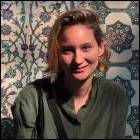
I was attracted to apply for CASA’s MSc in Smart Cities and Urban Analytics due to its emphasis on understanding the city through a trans-disciplinary and complex systems lens, whilst using an arsenal of programming, spatial analysis and statistical techniques to explore this perspective of the urban realm.
Prior to joining CASA in 2016, I had primarily conducted research and editorial work related to urban environmental sustainability in the third sector and academia in Kenya, Berlin and London. With a social sciences and humanities background (BA in anthropology, geography and journalism and an MA in Critical Media Studies), the learning curve was undeniably steep. However, the curriculum struck a balance between being both accessible and challenging for students with a diverse range of experiences and interests. It offered a broad scope of material and analytical tools which have since proven to be highly applicable. The weekly seminars additionally presented a handy window into data-led work taking place across sectors. The dedication and sincerity of the lecturers and others in the department, as well as collaborating with and learning from fellow students was above all invaluable.
CASA aided me to collaborate with Westminster City Council’s Business Intelligence team on my dissertation, which regarded noise and the role of busking in the West End’s night time economy. This opportunity allowed me to tackle a tangible, real-world problem within a local government context employing both quantitative and qualitative approaches. I was able to offer policy recommendations for the borough’s night time economy strategy which was still in its early stages. Eager to continue working in this vein, I began working for the local authority as an Analyst. In this role, I am able to inform evidence-based approaches to policy and more effective service delivery through various forms of data and spatial analysis, as well as contribute to the council’s formulation of strategies relating to data and “smart” applications of technology in the city. This MSc programme undoubtedly enabled me to think critically about the processes by which the Smart City promise is interpreted and shaped both in the short and long term.
 Close
Close

